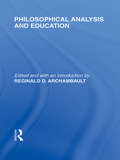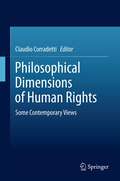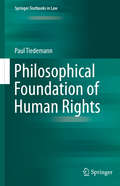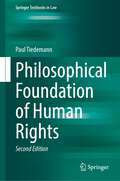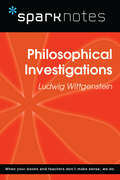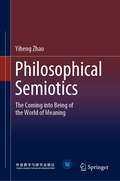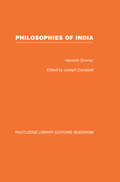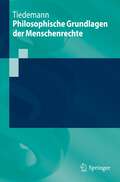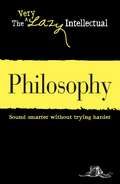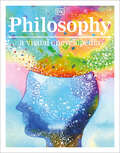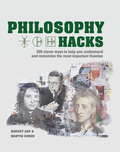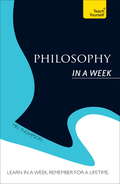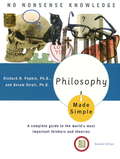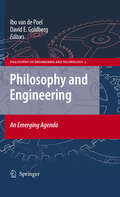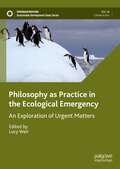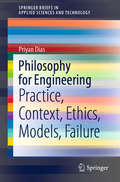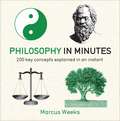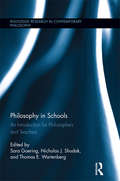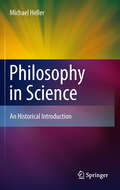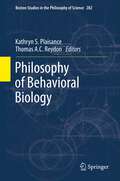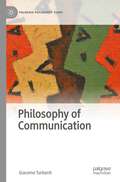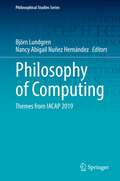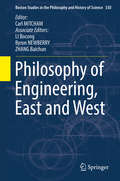- Table View
- List View
Philosophical Analysis and Education (International Library of the Philosophy of Education Volume 1)
by Reginald D. ArchambaultWhen originally published in 1965 this book reflected some of the new thinking among philosophers regarding the role of the discipline in its investigation of central issues in educaton. The essays are grouped into four major sections: The Nature and Function of Educational Theory; The Context of Educational Discussion; Conceptions of Teaching; and The Essence of Education. The concepts dealt with are of the first importance to any practical or theoretical discussion in education and the editor provides a generous introduction to the essays to aid the reader in his analysis of the issues.
Philosophical Dimensions of Human Rights
by Claudio CorradettiThis book presents a unique collection of the most relevant perspectives in contemporary human rights philosophy. Different intellectual traditions are brought together to explore some of the core postmodern issues challenging standard justifications. Widely accessible also to non experts, contributions aim at opening new perspectives on the state of the art of the philosophy of human rights. This makes this book particularly suitable to human rights experts as well as master and doctoral students. Further, while conceived in a uniform and homogeneous way, the book is internally organized around three central themes: an introduction to theories of rights and their relation to values; a set of contributions presenting some of the most influential contemporary strategies; and finally a number of articles evaluating those empirical challenges springing from the implementation of human rights. This specific set-up of the book provides readers with a stimulating presentation of a growing and interconnecting number of problems that post-natural law theories face today. While most of the contributions are new and specifically conceived for the present occasion, the volume includes also some recently published influential essays on rights, democracy and their political implementation.
Philosophical Foundation of Human Rights (Springer Textbooks in Law)
by Paul TiedemannThis textbook presents a range of classical philosophical approaches in order to show that they are unsuitable as a foundation for human rights. Only the conception of human dignity –based on the Kantian distinction between price and dignity – can provide a sufficient basis. The derivation of human rights from the principle of human dignity allows us to identify the most crucial characteristic of human rights, namely the protection of personhood. This in turn makes it possible (1) to distinguish between real moral human rights and spurious ones, (2) to assess the scope of protection for many codified human rights according to the criteria of “core” and “yard,” and (3) offers a point of departure for creating new, unwritten human rights. This philosophical basis supports a substantial reassessment of the case law on human rights, which will ultimately allow us to improve it with regard to legal certainty, clarity and cogency.The textbook is primarily intended for advanced law students who are interested in a deeper understanding of human rights. It is also suitable for humanities students, and for anyone in the political or social arena whose work involves human rights and their enforcement.Each chapter is divided into four parts: Abstracts, Lecture, Recommended Reading, and Questions to check reader comprehension. Sample answers are included at the end of the book.
Philosophical Foundation of Human Rights (Springer Textbooks in Law)
by Paul TiedemannThis textbook presents a range of classical philosophical approaches in order to show that they are unsuitable as a foundation for human rights. Only the conception of human dignity –based on the Kantian distinction between price and dignity – can provide a sufficient basis. The derivation of human rights from the principle of human dignity allows us to identify the most crucial characteristic of human rights, namely the protection of personhood. This in turn makes it possible (1) to distinguish between real moral human rights and spurious ones, (2) to assess the scope of protection for many codified human rights according to the criteria of “core” and “yard,” and (3) offers a point of departure for creating new, unwritten human rights. This philosophical basis supports a substantial reassessment of the case law on human rights, which will ultimately allow us to improve it with regard to legal certainty, clarity and cogency.In the second edition, errors have been corrected in numerous places, the text has been made clearer and easier to understand. In addition, more recent human rights issues have been newly included, especially those related to the Corona epidemic and climate change. The textbook is primarily intended for advanced law students who are interested in a deeper understanding of human rights. It is also suitable for humanities students, and for anyone in the political or social arena whose work involves human rights and their enforcement.Each chapter is divided into four parts: Abstracts, Lecture, Recommended Reading, and Questions to check reader comprehension. Sample answers are included at the end of the book.
Philosophical Investigations (SparkNotes Philosophy Guide)
by SparkNotesPhilosophical Investigations (SparkNotes Philosophy Guide) Making the reading experience fun! SparkNotes Philosophy Guides are one-stop guides to the great works of philosophy–masterpieces that stand at the foundations of Western thought. Inside each Philosophy Guide you&’ll find insightful overviews of great philosophical works of the Western world.
Philosophical Semiotics: The Coming into Being of the World of Meaning
by Yiheng ZhaoThis book attempts to solve the question whether semiotics is a methodology as is generally held and if the studies of meaning and the mind can shed light on a series of metaphysical issues, so that the edifice of semiotics could be erected on a philosophical ground. It proposes that a philosophical semiotics is, by necessity, a semiotic phenomenology about the construction of the “world of meaning” by signs, and any discussion about semiotics has to proceed around two core issues: meaning and the mind.This book particularly exemplifies the semiotic connections in various schools of traditional Chinese philosophies. In the “Pre-Imperial Age” (before BC 300), there emerged an abundance of semiotic thinking in China, from Yijing the first sign system that aims to explain everything in the world, to the Namists’s subtle argument about the form of meaning, from the Yin-Yang/five elements of the Han, to the “Things are non-existent while mind is non-non-existent” principle of the Vijñāptimātratāsiddhi School of Buddhism in the Tang, and from the Sudden Revelation of Chan Buddhism to the “Nothing outside the mind” endorsed by the Mindist Confucianism in the Ming. The mighty trend of philosophical heritage provides rich food to our understanding of the form of meaning.
Philosophies of India (Routledge Library Editions: Buddhism #9)
by Heinrich ZimmerOriginally published in 1973. The volume is divided into four sections: The introduction places the position of the Buddhist Tantras within Mahayana Buddhism and recalls their early literary history, especially the Guhyasamahatantra; the section also covers Buddhist Genesis and the Tantric tradition. The foundations of the Buddhist Tantras are discussed and the Tantric presentation of divinity; the preparation of disciples and the meaning of initiation; symbolism of the mandala-palace Tantric ritual and the twilight language. This section explores the Tantric teachings of the inner Zodiac and the fivefold ritual symbolism of passion. The bibliographical research contains an analysis of the Tantric section of the Kanjur exegesis and a selected Western Bibliography of the Buddhist Tantras with comments.
Philosophische Grundlagen der Menschenrechte (Springer-Lehrbuch)
by Paul TiedemannDieses Lehrbuch stellt zunächst eine Reihe von klassischen philosophischen Ansätzen vor, um zu zeigen, dass sie als Grundlage für die Menschenrechte ungeeignet sind. Nur das Konzept der Menschenwürde - basierend auf der kantischen Unterscheidung von Preis und Würde – ist als Grundlage geeignet. Die Ableitung der Menschenrechte aus dem Prinzip der Menschenwürde erlaubt es, das entscheidende Merkmal der Menschenrechte zu identifizieren, nämlich den Schutz der Personalität. Dies wiederum ermöglicht es, (1) die Menschenrechte sinnvoll zu interpretieren, (2) zwischen echten und unechten moralischen Menschenrechten zu unterscheiden, (3) den Schutzumfang vieler kodifizierter Menschenrechte nach den Kriterien „Kern“ und „Hof“ zu differenzieren und bietet (4) einen Ausgangspunkt für die „Entdeckung“ neuer, ungeschriebener Menschenrechte. Diese philosophische Grundlage ermöglicht eine grundlegende Neubewertung der Rechtsprechung zu den Menschenrechten, die es letztlich ermöglichen wird, sie im Hinblick auf Rechtssicherheit, Klarheit und Schlüssigkeit zu verbessern.Das Lehrbuch richtet sich in erster Linie an fortgeschrittene Studierende der Rechtswissenschaft, die an einem tieferen Verständnis der Menschenrechte interessiert sind. Es eignet sich aber auch für Studierende der Geisteswissenschaften und für alle, die im politischen oder sozialen Bereich tätig sind und sich mit Menschenrechten und deren Durchsetzung befassen.Jedes Kapitel ist in vier Teile gegliedert: Zusammenfassungen, Vorlesung, empfohlene Lektüre und Fragen, um das Verständnis des Lesers zu überprüfen. Musterantworten sind am Ende des Buches enthalten.
Philosophy
by Adams MediaDid you sleep through Intro to Philosophy? Does Plato leave you in the dark? Fear not! The Very Lazy Intellectual: Philosophy introduces you to both the major thinkers and the fundamentals of philosophical thought. With information on everyone from Socrates to Sartre, and theories from Epicureanism to Empiricism, you'll have everything you need to solve your existential crises in no time.
Philosophy A Visual Encyclopedia (DK Children's Visual Encyclopedias)
by DKThe perfect book for young readers looking to explore some of life's biggest questions.Thousands of years ago, ancient philosophers asked some important questions: "What is real?", "What is the point of my existence?", "Why is there evil in the world?", and "What can I know?" These questions have gone on to spark passionate debates about our existence and how we understand the world around us. In this engaging and accessible introduction to philosophy, readers aged 11+ will be introduced to a variety of philosophical ideas through the teachings of Plato, Confucius, Simone de Beauvoir, and many more.Vibrant, reader-friendly illustrations bring the history of ideas and thinking to life, and provide topics for reflection and debate. With biographies of the most influential philosophers from around the world, young readers will explore the questions that have been fundamental to the development of scientific study, logical thinking, religious beliefs, freedom in society, and much more. Thought experiments peppered throughout will help to connect readers with the theories presented so they can apply them to their own lives.
Philosophy Hacks (Hacks Ser.)
by Robert Arp Martin CohenDiscover the simple way to understand and remember the most groundbreaking concepts in 3,000 years of philosophical thought. Each idea is broken down into three stages: 1/ The helicopter view, which gives you an introduction to the idea, and some context around it. 2/ The shortcut, which gives you the core elements of the theory, along with a range of examples that everyone can understand. 3/ The hack, which is a one-liner designed to stick in your memory and give you an instant grasp of the concept.From Pascal's Wager to Kant's categorical imperative, and from Camus's Existential Nihilism to Arendt's Banality of Evil, there are 100 concepts explained. The perfect introduction to philosophy, this is a great new way to learn about the most important philosophical ideas and concepts in a way that makes them easy to recall even months after reading the book.
Philosophy Hacks (Hacks)
by Robert Arp Martin CohenDiscover the simple way to understand and remember the most groundbreaking concepts in 3,000 years of philosophical thought. Each idea is broken down into three stages: 1/ The helicopter view, which gives you an introduction to the idea, and some context around it. 2/ The shortcut, which gives you the core elements of the theory, along with a range of examples that everyone can understand. 3/ The hack, which is a one-liner designed to stick in your memory and give you an instant grasp of the concept.From Pascal's Wager to Kant's categorical imperative, and from Camus's Existential Nihilism to Arendt's Banality of Evil, there are 100 concepts explained. The perfect introduction to philosophy, this is a great new way to learn about the most important philosophical ideas and concepts in a way that makes them easy to recall even months after reading the book.
Philosophy In a Week: Teach Yourself
by Mel ThompsonLearn in a week, remember for a lifetime!In just one week, this accessible book will give you knowledge to last forever. End of chapter summaries and multiple choice questions are all designed to help you test your knowledge and gain confidence. So whether you are a student or you simply want to widen your knowledge, you will find this seven-day course a very memorable introduction.Sunday: Think about knowledge like a philosopherMonday: Consider what science is and how we gain knowledge of the natural worldTuesday: Explore how we speak and think, and how this relates to the philosophy of mind.Wednesday: Learn how philosophers view and engage with religionThursday: Engage with ethics - how we decide what is the right thing to doFriday: Discover how political philosophers have balanced the role of government with individual freedom.Saturday: Explore continental ideas such as existentialism and how the next generation of philosophers may build on them.
Philosophy In a Week: Teach Yourself
by Mel ThompsonLearn in a week, remember for a lifetime!In just one week, this accessible book will give you knowledge to last forever. End of chapter summaries and multiple choice questions are all designed to help you test your knowledge and gain confidence. So whether you are a student or you simply want to widen your knowledge, you will find this seven-day course a very memorable introduction.Sunday: Think about knowledge like a philosopherMonday: Consider what science is and how we gain knowledge of the natural worldTuesday: Explore how we speak and think, and how this relates to the philosophy of mind.Wednesday: Learn how philosophers view and engage with religionThursday: Engage with ethics - how we decide what is the right thing to doFriday: Discover how political philosophers have balanced the role of government with individual freedom.Saturday: Explore continental ideas such as existentialism and how the next generation of philosophers may build on them.
Philosophy Made Simple (2nd Edition, Revised)
by Richard H. Popkin Avrum StrollFor almost four decades, Made Simple books have set the standard for continuing education and home study. In answer to the changing needs of today's marketplace, the Made Simple series for the '90s presents a thoroughly up-to-the-minute portfolio of skills, information, and experience, with revised and updated editions of bestselling titles, plus a whole range of new subjects from personal finance to office management to desktop publishing.
Philosophy and Engineering: An Emerging Agenda
by Ibo van de Poel David E. GoldbergWhereas science, technology, and medicine have all called forth dedicated philosophical investigations, a fourth major contributor to the technoscientific world in which we all live - that is, engineering - has been accorded almost none of the philosophical attention it deserves. This volume thus offers a first characterisation of this important new field, by some of the primary philosophers and ethicists interested in engineering and leading engineers interested in philosophical reflections. The volume deals with such questions as: What is engineering? In what respect does engineering differ from science? What ethical problems does engineering raise? By what ethical principles are engineers guided? How do engineers themselves conceive of their profession? What do they see as the main philosophical challenges confronting them in the 21st century? The authors respond to these and other questions from philosophical and engineering view points and so illustrate how together they can meet the challenges and realize the opportunities present in the necessary encounters between philosophy and engineering - encounters that are ever more important in an increasingly engineered world and its problematic futures.
Philosophy as Practice in the Ecological Emergency: An Exploration of Urgent Matters (Sustainable Development Goals Series)
by Lucy WeirThis book argues that philosophy is as practical as plumbing and what we need right now is what philosophers can offer as philosophers to help us all, our species, and beyond, through this ecological emergency, this climate change, this anthropocene. This book is about the meaning and purpose of philosophy as a way of, a practice of, responding to the ecological emergency, which includes climate change, biodiversity loss, pollution, habitat destruction, and all the associated impacts that fragment, and threaten to create collapse, among the systems that created and sustain us. There are the related economic and social impacts, the fragmentation of communities and political ideologies through attitude polarisation, and the increasing threats to systems by those who seek to promote further exploitation at the expense of attempts to regain some system of cooperation and an attitude of compassion which is at the heart of our survival strategies as a species. Philosophy has always sought to address questions related both to our place in the universe, and to how to live, given our understanding of our place. Those of us committed to a philosophical life have used a range of metaphors and narratives to enlighten, and to exhort to action, those who would seek to understand what to do, how, and why. Philosophy has played a key role in helping us as a species to respond to the ecological emergency. What, then, is the practice of philosophy, given that we’re in an ecological emergency?This question is the thread, and it forms the framework for the dialogue that runs through the book.
Philosophy for Engineering: Practice, Context, Ethics, Models, Failure (SpringerBriefs in Applied Sciences and Technology)
by Priyan DiasThis book highlights the unique need for philosophy among engineers, which stems from issues regarding their knowledge (epistemology), role or being (ontology) and influence (ethics). It discusses practice, context, ethics, models and failure as key aspects of engineering, and provides an easy but essential introduction to philosophy for engineers by presenting four key philosophers and linking them to these aspects: Karl Popper (failure), Thomas Kuhn (models), Michael Polanyi (practice & ethics) and Martin Heidegger (context & ethics). Popper, Kuhn and Polanyi are philosophers of science (epistemologists) who have challenged the view that science is a ‘cool, detached’ discipline, since it also depends on human imagination (Popper), consensus (Kuhn) and judgment plus artistry (Polanyi); factors that are central to engineering. Heidegger (an ontologist) critiqued technology on the one hand (ethics), but also stressed the importance of ‘doing’ over ‘knowing,’ thus ‘authenticating’ the highly pragmatic engineering profession. Science is the ‘core’ component of engineering, which is overlaid by a variety of heuristics . Practice-based knowledge can be formalized, with artificial intelligence (AI) offering a valuable tool for engineering, just as mathematics has done for science. The book also examines systems thinking in engineering. Featuring numerous diagrams, tables and examples throughout, the book is easily accessible to engineers.
Philosophy in Minutes
by Marcus WeeksPhilosophy in Minutes distills 200 of the most important philosophical ideas into easily digestible, bite-sized sections.The core information for every topic - including debates such as the role of philosophy in science and religion, key thinkers from Aristotle to Marx, and introductions to morality and ethics - is explained in straightforward language, using illustrations to make the concepts easy to understand and remember.Whether you are perplexed by existentialism or pondering the notion of free will, this accessible small-format book will help any reader to quickly grasp the basics of this highly nuanced subject.
Philosophy in Schools: An Introduction for Philosophers and Teachers (Routledge Studies in Contemporary Philosophy #47)
by Thomas E. Wartenberg Sara Goering Nicholas J. ShudakAll of us ponder the big and enduring human questions—Who am I? Am I free? What should I do? What is good? Is there justice? Is life meaningful?—but this kind of philosophical interrogation is rarely carefully explored or even taken seriously in most primary and secondary school settings. However, introducing philosophy to young people well before they get to college can help to develop and deepen critical and creative thinking, foster social and behavioral skills, and increase philosophical awareness. Philosophy in Schools: An Introduction Philosophers and Teachers is an invaluable resource for students and practitioners who wish to learn about the philosophy for children movement, and how to work its principles into their own classroom activities. The volume provides a wealth of practical information, including how to train educators to incorporate philosophy into their daily lessons, best practices and activity ideas for every grade level, and assessment strategies. With contributions from some of the best practitioners of philosophy for children, Philosophy in Schools is a must-have resource for students of philosophy and education alike.
Philosophy in Science
by Michael HellerThe traditional topics of the "philosophy of nature" -- space, time, causality, the structure of the universe -- are overwhelmingly present in our modern scientific theories. This book traces the complex paths that discussion of these topics has followed, from Plato and Aristotle, through Descartes, Leibniz, Kant and other great thinkers, right up to the relativistic cosmologies and the grand unified theories of contemporary science. In the light of this historical development, it becomes clear that modern science gives us not only a technological power over the world, but also a deeper understanding of physical reality. In this sense, science could be regarded as an heir to the traditional "philosophy of nature". Moreover, the reader will learn why science itself deserves to be the subject of philosophical reflection.
Philosophy of Behavioral Biology
by Thomas A.C. Reydon Kathryn S. PlaisanceThis volume provides a broad overview of issues in the philosophy of behavioral biology, covering four main themes: genetic, developmental, evolutionary, and neurobiological explanations of behavior. It is both interdisciplinary and empirically informed in its approach, addressing philosophical issues that arise from recent scientific findings in biological research on human and non-human animal behavior. Accordingly, it includes papers by professional philosophers and philosophers of science, as well as practicing scientists. Much of the work in this volume builds on presentations given at the international conference, "Biological Explanations of Behavior: Philosophical Perspectives", held in 2008 at the Leibniz Universität Hannover in Germany. The volume is intended to be of interest to a broad range of audiences, which includes philosophers (e.g., philosophers of mind, philosophers of biology, and metaethicists), as well as practicing scientists, such as biologists or psychologists whose interests relate to biological explanations of behavior.
Philosophy of Communication (Palgrave Philosophy Today)
by Giacomo TurbantiBy comprehensively exploring the theoretical questions raised by professional communication, this book provides an introduction to the philosophy of communication. Key Features:Arranged in three parts encompassing the theory of communication, conflict transformation and the role communication plays within organizations. Examines how agreement is reached through communication, how such agreement is negotiated between different perspectives and how such negotiation produces our organizations. Includes a full range of pedagogical features, including study questions, essay questions. chapter summaries, focus points and suggestions for further reading. Philosophy of Communication is essential reading for all students of the philosophy of communication.
Philosophy of Computing: Themes from IACAP 2019 (Philosophical Studies Series #143)
by Björn Lundgren Nancy Abigail Nuñez HernándezThis book features a unique selection of works presented at the 2019 annual international conference of the International Association for Computing and Philosophy (IACAP). Every contribution has been peer-reviewed, revised, and extended. The included chapters are thematically diverse; topics include epistemology, dynamic epistemic logic, topology, philosophy of science and computation, game theory and abductive inferences, automated reasoning and mathematical proofs, computer simulations, scientific modelling, applied ethics, pedagogy, human-robot interactions, and big data, algorithms, and artificial intelligence.The volume is a testament to the value of interdisciplinary approaches to the computational and informational turn. We live in a time of tremendous development, which requires rigorous reflection on the philosophical nature of these technologies and how they are changing the world. How can we understand these technologies? How do these technologies change our understanding of the world? And how do these technologies affect our place as humans in the world? These questions, and more, are addressed in this volume which is of interest to philosophers, engineers, and computer scientists alike.
Philosophy of Engineering, East and West
by Carl Mitcham Bocong Li Byron Newberry Baichun ZhangThis co-edited volume compares Chinese and Western experiences of engineering, technology, and development. In doing so, it builds a bridge between the East and West and advances a dialogue in the philosophy of engineering. Divided into three parts, the book starts with studies on epistemological and ontological issues, with a special focus on engineering design, creativity, management, feasibility, and sustainability. Part II considers relationships between the history and philosophy of engineering, and includes a general argument for the necessity of dialogue between history and philosophy. It continues with a general introduction to traditional Chinese attitudes toward engineering and technology, and philosophical case studies of the Chinese steel industry, railroads, and cybernetics in the Soviet Union. Part III focuses on engineering, ethics, and society, with chapters on engineering education and practice in China and the West. The book’s analyses of the interactions of science, engineering, ethics, politics, and policy in different societal contexts are of special interest. The volume as a whole marks a new stage in the emergence of the philosophy of engineering as a new regionalization of philosophy. This carefully edited interdisciplinary volume grew out of an international conference on the philosophy of engineering hosted by the University of the Chinese Academy of Sciences in Beijing. It includes 30 contributions by leading philosophers, social scientists, and engineers from Australia, China, Europe, and the United States.
